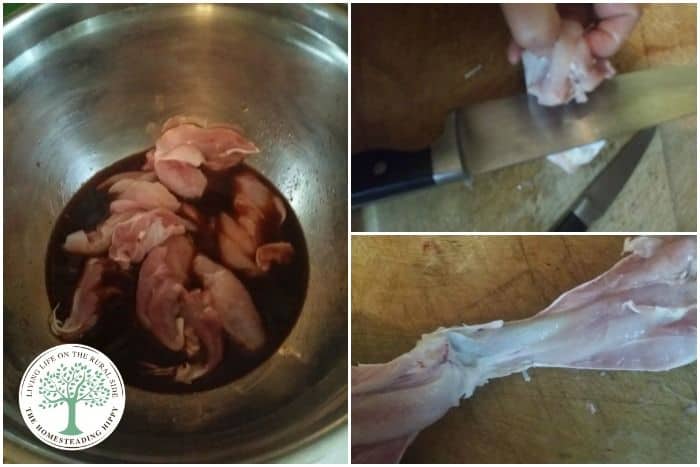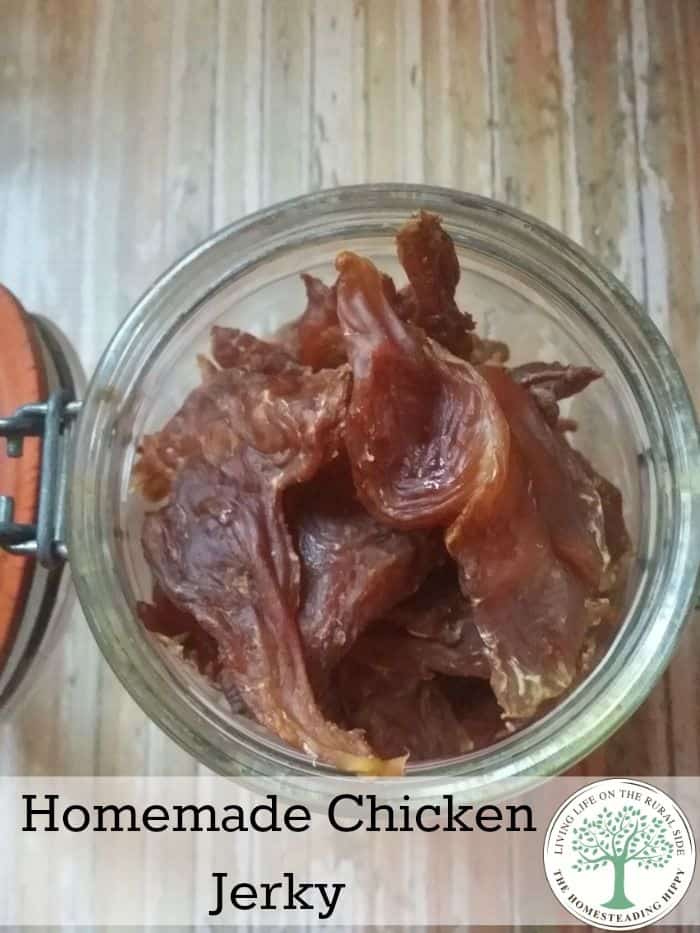In an effort to clean out our freezers for the upcoming gardening, chicken and turkey “season”, I have been making a lot of jerky lately. After all the canning of chicken, making of soup for the pantry and broth galore, I needed to do something else with it. So, chicken jerky came to be in our home. It is a great way to use up extra chicken, preserve it for hiking or road trips,

My kids love it, my hubby loves it, and the dog loves it as much as she can. Well, when no one is looking anyway. For snacking, nothing beats it in our house! It is protein-packed, savory, and satisfying. If you want to try some delicious homemade chicken jerky for yourself, I will tell you all about it below.
After all the canning of chicken, making of soup for the pantry and broth galore, I needed to do something else with it. So, chicken jerky came to be in our home.
What Cut of Chicken Should You Use?
You can really use any cut of chicken meat you want for this jerky recipe as long as you slice it thinly enough. Aim for strips that are at most ¼ inche thick. However, breasts are far and away the best cut to use for simplicity, taste, and consistency.
But if you want to debone wings or legs, like I have in this recipe, you’ll find the results are still totally delicious. It’s just a matter of how much work you want to put into prepping the chicken prior to dehydration.

Recipe Instructions
- Prep Time: 30 min.
- Total Time: 24-30 hrs.
Prepping the Chicken
When I’m cutting up a whole chicken, I usually use the breasts and thighs for jerky. I de-bone the thighs so I can use them like the breasts when I can. Both work just fine in the recipe for me, but it’s mainly leg meat that I’m using here.
To prep the thigh meat, what you will need to do is cut very carefully down the leg and then slice it in half. Then, cut the main part of the meat off the bone. You will want to be using a very sharp knife for this, as it will minimize your risk of injury from slipping.
The leg meat has a lot of tendons, and you will want to make sure to take as much off as you can before slicing into strips and pieces. They don’t have to be regularly shaped for this recipe, but do make sure they are the same thickness and overall size to ensure consistent drying: you want them less than ¼ inch (6 mm) thick, but no thicker!
This can easily be done with a sharp knife, and just cutting it as close to the meat as possible. Once you have your meat cut off the bones, stick the bones in some water and make some broth or discard.
Pre-Freeze for Uniform Slicing (Optional)
One pro tip I learned a while back that will certainly help you is to pre-freeze your meat prior to doing it…
All you need to do is pop your cuts into the freezer for 30 minutes to an hour to let them firm up. This keeps them from being all squishy and wriggly when you’re cutting them and allows you to make perfectly uniform, even slices with a good sharp knife.
It really does make all the difference. Now, you don’t have to do this, but understand that if you have some pieces that are a little thicker and others a little thinner, you’ll end up with a few bits of jerky that aren’t fully dehydrated when the rest are done.
This means you’ll have to pause the dehydrator, pick the ones that are done out, and keep processing the rest, or else you risk spoiling the whole batch and maybe even getting sick!
Marinate
Next, you will want to soak the chicken in a marinade overnight. I used my father’s beef jerky recipe, tweaking it some for chicken.
What you need:
- 1 cup olive oil
- ½ cup apple cider vinegar
- 1 Tbsp. garlic powder
- 1 Tbsp. onion salt
- ¼ tsp. curing salt
- 1 tsp. black pepper
- 3 Tbsp. soy sauce
Simply add all the ingredients in a large bowl, and toss the chicken strips in. Stir to coat all the pieces, and allow to marinate in the refrigerator for 12-15 hours.
Once the pieces have marinated simply remove them, discard the marinade and place them on your dehydrator trays or racks as appropriate for your model.
Dehydrating Your Jerky
Make sure that none of the pieces are overlapping, and give them a little space between each other; crowding and layering will interfere with drying and promote spoilage!
Dehydrate on medium-high (165°F) for around 12 hours, or consult the manual for your dehydrator. DO NOT sample jerky until it’s fully dried: bacteria, viruses and other germs may not be all killed. This is a great time to add beef jerky that the kids won’t touch, by the way.
After about 10 hours, check the pieces for the first time and test them. When they look dry, pull one piece out and bend it by holding either end; they should feel rubbery and break or split cleanly when you bend them. You don’t want the jerky to snap like a cracker or twig; it is safe, but won’t be as good!
Also, perform the rip test on a larger piece of jerky… Grab one end and try to tear it in half down the middle, lengthwise. It should be tough, but peel apart readily. Look closely for the presence of thin, white strands or fibers; if you see them, you know that your jerky is dry enough.
If you do the rip test and don’t see any white fibers, it isn’t ready! Put it back in the dehydrator and keep processing.
By doing these tests, you know that nearly all the water is all out! If you leave them too moist, they will mold and spoil very quickly, and you will risk food poisoning. Not good!
Consider a Quick Bake After Dehydrating
Compared to dehydrating beef for making jerky, chicken, turkey, and other kinds of poultry are a little riskier. If it retains a little too much moisture or the inner part of the meat didn’t reach that critical 165° F / 75° C temperature, the stage can be set for food poisoning.
It’s nothing to worry about, and it shouldn’t scare you away from making chicken jerky, but you need to be careful, especially if you’re dehydrator doesn’t have precise temperature control.
The trick is to give your jerky a quick extra bake after it’s finished. Once the pieces look right and are out of the dehydrator, preheat the oven to 300° F / 150° C, and then pop the pieces in on a baking sheet for 10 to 12 minutes. Then take them out and let them cool as normal.
This won’t affect the quality of the finished jerky, but it will ensure that all of those germs are toast. I highly recommend this step.
Do I Have to Use Curing Salt?
I strongly recommend that you do. I know some jerky aficionados don’t want to use curing salt in their marinade, and for beef, venison and red meat that’s fine. For chicken, turkey, and other birds, you really should.
It’s good to have multiple steps to ensure proper preservation and the elimination of harmful germs when making any kind of jerky from poultry.
The presence of sodium nitrite in the curing salt will further help to remove germs during marination and protect the finished jerky.
Storage
When finished, set the racks aside and let the jerky pieces cool down to room temp completely. Store them in a clean, airtight container for up to 4 months. Honestly, though, I haven’t had a batch last longer than a week…it’s that good!


Heather’s homesteading journey started in 2006, with baby steps: first, she got a few raised beds, some chickens, and rabbits. Over the years, she amassed a wealth of homesteading knowledge, knowledge that you can find in the articles of this blog.
Learn more about Heather and the rest of the writers on this page.

Looks delicious. Aside from canning, would this be a good use for old hens? I’ve pinned for future reference :).
this would be a VERY good use for old hens 😉
So this is raw poultry
Just as much as beef jerky is raw beef, except we dry this at a higher temperature, 165, which is what you actually cook poultry too.
I would like to make chicken jerky for my pups. I tried the oven method yesterday (230 degrees, on wire racks for 5 hours) They came out very dry and splintered into sharp pieces. Do they turn out more chewy when using a food dehydrator? Any advice is much appreciated
i have the same texture with either the deydrator or the oven. Try turning your oven down a bit to see if that helps?
They say in one recipe in an oven 200°for 5-5 1/2 hours should be good enough but they also had a dehydrater method.
xI use a nesco at 160 which is basically dried meat for chicken. We do 9 to 12 breasts in a run which depending in size gives 2 gallon size ziplocs so one can be frizen and the other used. You need a scale at the serving area so the animal gets a set amount or your generosity will make it fat.
My doggie has congestive heart disease can you make this not using salt or is that totally necessary? I know salt is used to cure meats keeping them longer but I need to avoid.
we use meat only and have done for years. you would eat it and find it tasty plain.
Sorry, but 12-24 hours to make jerky is ridiculously long for jerky. 7-9 hours should be more than enough for most commercial dehydrators. You’re just wasting energy & time. Jerky should still have a bit of flexibility when it is done. Almost certainly after all the time you are suggesting, the jerky snaps in half if bent. It not do so. However, one should also keep in mind that the temperature & air circulation varies from tray to tray. I’m using 6 circular trays, which holds over 5 lb of the raw chicken, allowing some space between the slices. I flip them over and reverse the top to bottom order of the trays after 3 hours and again after another 2-3 hours and at 7.5 hours they are adequately dry. I do not put them in plastic bags until they have cooled completely because even the apparently dry chicken will still give of some moisture that will condense on the inside of the bag if not allowed to cool first. I use liquid smoke, because I like a smokier flavor, a bit of allspice and both black & red pepper (flakes) because I like it spicy, along with some sugar or molasses…NOT honey, which some people suggest, because that leave even the dry jerky sticky. I also use a touch of pink curing salt, just as an extra precaution. Not much is needed…1 tsp per 5 lbs is plenty. Several other comments: For a recipe like this, you should state the amount of meat to which you add your marinade. NO oil is necessary for jerky. In fact, if it is not eaten quickly enough, oils OR visible fat in the chicken will become rancid. Finally, I think the amount of vinegar you suggest is too much. It’s so much that you will almost be pickling the meat. The vinegar should flavor the meat, not more than that. Sorry for being picky…but I’ve become such an expert on jerky that I eat it instead of cooking chicken most of the time!
Can you send your recipe please?
Info at darleneglobal dot com
see you at your funeral… 7 hours for beef jerky is nuts!
If the jerky is sliced thin like it should be and marinated with sodium nitrite cure in the mix then 7 hours at 165-170 degrees is plenty. The strips should be tested by bending them to make sure. I’ve used this method for ten years or more and kept the jerky in my car and on the shelf for weeks if not longer with perfect results.
Nitrites are a newer phenomenon for dehydrating meat in the span of humanity. It makes a lot of people sick. Just as good without preservatives, including the modern hidden preservative “celery powder” (unless it’s organic. An fyi for people who need to avoid preservatives. Cheers!
Can you do both beef and chicken jerky at the same time in the dehydrator ?
Great comments but keep in mind that unlike us, some folks own the cheaper dehydrators that will never reach 165 degrees maintained internally for one hour or more as recommended by the FDA. Even with the use of sodium nitrate (cure #1) I would recommend that they bake the jerky in the oven for a minimum of 1 hour at 165-175 degrees.
Thank you!
Is that time and temperature adequate to kill any germs, bacteria, etc?
I went to a meat locker and bought some jerky spice. The butcher told me that the spice included some “cure” which is nessesary to kill germs since the meat will not get hot enough to kill the germs. The “cure” is sodium nitrate. Please tell me how to “cure” the meat if I don’t do it the way the butcher told me. Also, how important is this to do?
Thank you in advance.
The cure should be sodium nitrite, not nitrate. There is a great difference and completely different uses. Nitrate cure mix has some nitrite in it to provide immediate cure but breaks down into nitrite too slowly to provide adequate protection for raw chicken being dehydrated, regardless of the marinate. Most jerky cure mixes don’t include enough salt to adequately kill the bad bacteria because they would leave the finished product undesirably salty so sodium nitrite is added to insure that bacteria can’t develop.
Can I make chicken jerky from roasted or cooked up chicken ???
Maria
NO! you will only get the dried version of what you had. Probably so dry and crunchy that it will be undesirable and not effectively protected from future bacteria development.